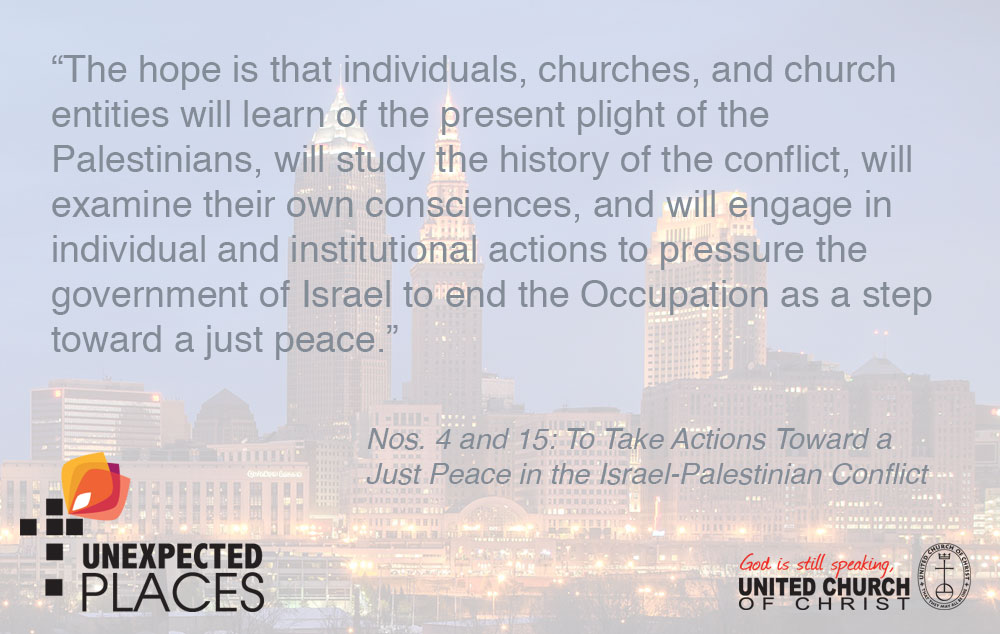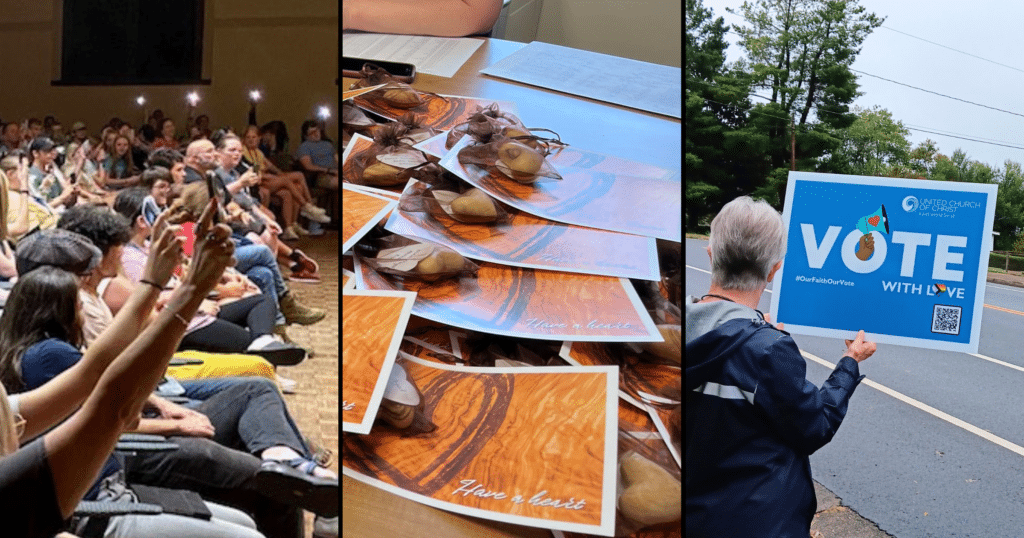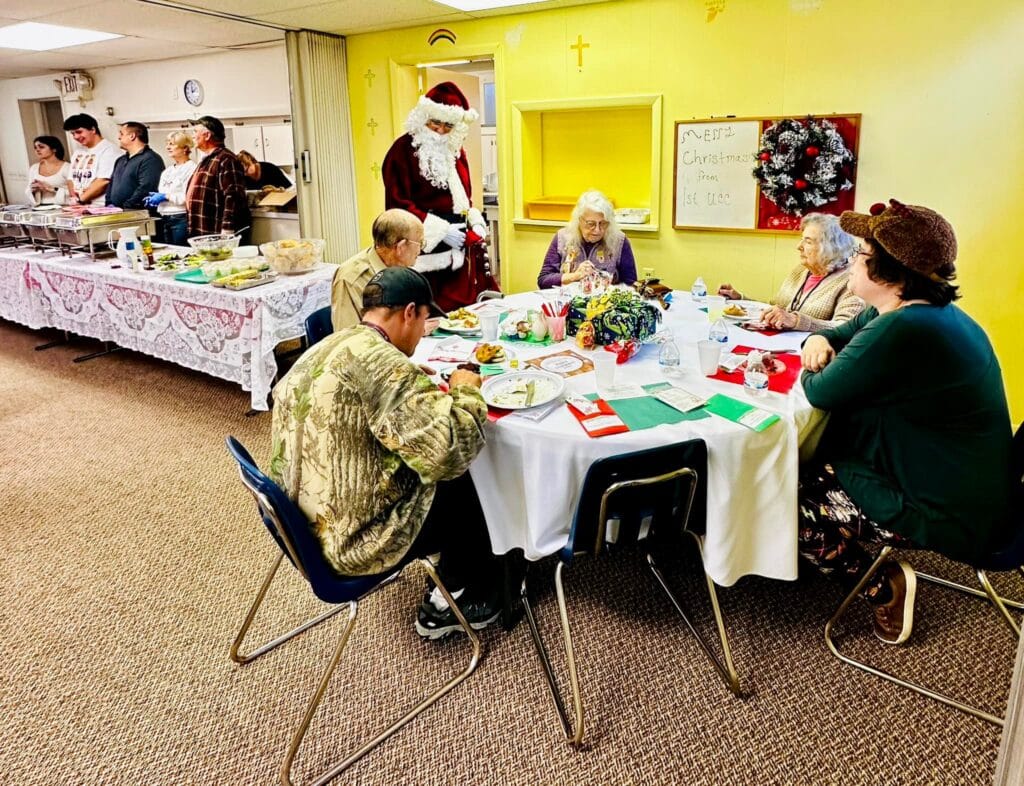Resolving to work for peace in Israel-Palestine
 Peace advocates in at least seven conferences of the United Church of Christ are pressing the denomination’s governing body to support a “clear, unequivocal call for specific actions toward ending the [Israeli] occupation of Palestinian territories.” The proponents of two resolutions to be considered by delegates hope that the General Synod will follow that call by “adding its weight to a world-wide movement toward a just peace in the region” aimed at ending the decades-long violence in the Middle East between the two peoples.
Peace advocates in at least seven conferences of the United Church of Christ are pressing the denomination’s governing body to support a “clear, unequivocal call for specific actions toward ending the [Israeli] occupation of Palestinian territories.” The proponents of two resolutions to be considered by delegates hope that the General Synod will follow that call by “adding its weight to a world-wide movement toward a just peace in the region” aimed at ending the decades-long violence in the Middle East between the two peoples.
One strategy of the movement is targeted divestment from companies that profit from the Israeli occupation of the West Bank and Gaza, and the boycott of companies whose products are produced in Israeli settlements in the occupied territories.
Four conferences of the UCC are bringing forward two resolutions built around that idea— the Central Atlantic, Central Pacific and the New York Conference on one, and the New Hampshire conference on the other — that both share the title “Actions Toward a Just Peace in Israeli-Palestinian Conflict.” A third resolution, brought by the Northern California-Nevada Conference, asks the church to consider if the Israeli government’s actions against Palestinians meet the definition of apartheid. The resolutions will be considered at the 30th General Synod, which will convene from June 26 through 30 in Cleveland.
The resolutions on just peace in the conflict both propose a four-point strategy by the wider church to help end the Israeli-Palestinian conflict: First, the resolutions suggest a study of the document “Kairos Palestine,” which invites the global Christian community to witness firsthand what is happening in the West Bank and Gaza; Second, economic leverage that includes divestment from “companies that profit from the Israeli occupation of Palestinian territories and boycott of products produced in such territories by Israeli companies”; Third, political pressure by petitioning Congress to ensure that “aid to Israel violates neither the U.S. Foreign Assistance Act nor the U.S. Arms Export Control Act”; and fourth, interfaith dialogue “among the three Abrahamic faiths aimed at reaching religious reconciliation and achieving political resolution.”
“The UCC and predecessor bodies have long history of justice and peacemaking, and the General Synod has adopted resolution on the Palestinian-Israeli conflict as far back as 1967,” said the Rev. John R. Deckenback, conference minister of the Central Atlantic Conference. “This year’s resolution is built upon the foundation of the 2005 economic leverage resolution, which called for economic resources to try and end the occupation. We, the authors, have been in conversion with Palestinian Christian friends, and the rest of the world has seen the situation has not significantly improved since 2005. So a strong case can be made the situation has gotten worse, and that the tools of occupation have gotten more sophisticated and troublesome.”
The UCC is one of three denominations that will consider resolutions which, in part, call for an end of financial support for Israel’s occupation of the West Bank and Gaza. The Episcopal Church and the Mennonite Church will also take up the issue this summer. In 2014, the Presbyterian Church (USA) and United Methodist Church divested from a handful of U.S. companies involved in the occupation, while various Quaker bodies have done the same.
The worldwide boycott, divestment and sanction (BDS) movement has, according to the proposed resolutions, resulted in losses of $26 million in contracts by Veolia—a French-based company that offers water, waste and transportation solutions, as well as the divestment from Israeli banks by European banks and pension funds, and a loss of revenue by SodaStream. The UCC resolutions call for divestment from Motorola, Hewlett Packard (HP), Caterpillar, Veolia and G4S, a security company that says it will end business in Israel in 2017.
Gay Harter, an activist of the UCC Palestine-Israel Network, a grass roots coalition, said her group envisions the upcoming resolutions as a “follow-up to the 2005 resolution, as a way of taking the next step. In the last 10 years, the enormous changes in facts on the ground and increased pressure on Palestinians, the growth of settlements, and the inability of the U.S. in getting Israel to stop settlement construction, have led to this growing movement for boycott, divestment and sanctions.”
When the 2005 resolution calling for economic leverage to try and end the occupation was presented, Deckenback said proponents felt “they were sticking their necks out.” This summer, he feels support is much broader, grown beyond the four original sponsoring conferences. The Connecticut Conference, Pacific Northwest Conference and Illinois Conference have also adopted versions of the BDS resolution at their annual meetings, and two more conferences (Minnesota and Massachusetts) are slated to vote on the issue at their meetings this week.
“It’s a different reality. Before we were knocking on the door and saying we should pay attention to this,” Deckenback said. “You had your classic UCC caucus, the UCC-PIN, trying to pay attention to all this and keep our feet to the fire, and the Central Atlantic Conference used their template for this resolution as a base.”
Harter and other advocates began organizing after an initial trip to Israel-Palestine in 2006 by looking for people on national level to form national network that, as a grassroots group within the UCC, would push for next steps and follow up on the resolutions that passed, eventually forming UCC-PIN in January 2012. The group has been one of the driving forces behind the proposed 2015 resolutions.
The resolutions have their critics, particularly those who claim BDS movement would threaten Israel’s security. Both Deckenback and Harter disagree.
“If anyone looks carefully at the UCC, it’s hard to see we are anti-Israel,” Deckenback said. “We have clear, long history of calling for justice and peacemaking, and in many metropolitan places, we have close relationships with American Jewish colleagues.”
The denomination has recognized Israel’s right to live securely within its borders (General Synod 1987) and confessed that anti-Semitism is a sin (General Synod 2001).
“Many of those who accuse us of being of anti-Semitic want to conflate criticism of the Israeli government and military with anti-Semitism,” Harter said. “I don’t believe the resolutions are anti-Semitic because they aren’t directed at all Jews or Israelis, but rather at the Israeli government’s policies and occupation, which under international law is illegal. American law gives us the freedom to criticize our government and other governments, and we have the freedom to criticize our government’s use of our tax dollars.”
Deckenback and Harter both point out that within the Jewish community, there is some support for ending settlement expansion and for the BDS movement. The Washington, D.C., firm J Street found that 15 percent of American Jews support some form of boycotting Israeli-made products and 25 percent support doing away with the settlements. A CNN poll this year also found that two-thirds of Americans want the U.S. government to take a neutral stance on the Israeli-Palestinian conflict.
“There are differing opinions within the Jewish community on these issues,” Harter said. “It’s a much broader discussion in the Jewish community compared to 10 years ago, and it is wrestling with theses issues more than it has in the past.”
While both BDS resolutions have been forwarded a committee of the General Synod for consideration, they are nearly identical in language and multiple leaders from various settings of the church expect that the committee will merge the resolutions for presentation on the floor.
“It’s been exciting and challenging to plunge into this work. We have support from the UCC, Jewish and Palestinian communities,” Harter said. “It’s not an easy conversation and it’s painful for many, but were are being more honest than in the past in facing theses issues and wrestling with our conscience.”
“I have been back and forth to the region eight or nine times and tried to understand the situation,” Deckenback said. “It needs to be resolved, and the continued open sores on the landscape of the Holy Land are not of use to us.”
Related News
Year in Review: Top news highlights of 2024
The United Church of Christ News team has spent each week of 2024 delivering stories that...
Read MoreNo more lonely little Christmases: Chasing away the blues now and into the New Year
With the loneliness epidemic in the U.S. continuing to affect every one in five people, many...
Read MoreUCC Annual Report video brings to life impactful ministries
Leaders of the United Church of Christ are thrilled to share the newly released 2024 Annual...
Read More


